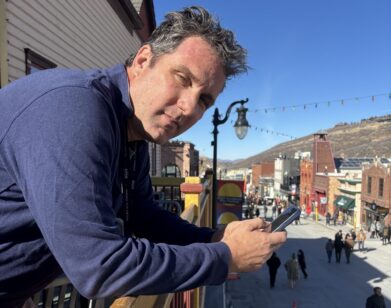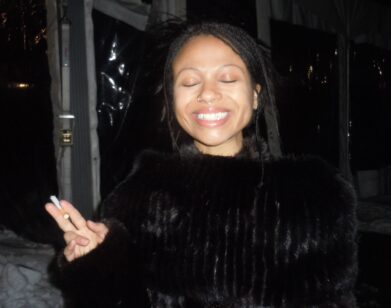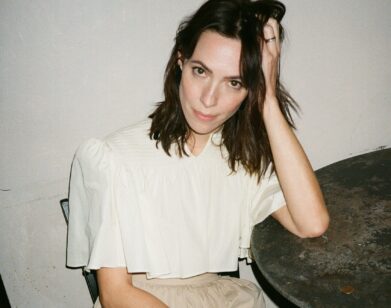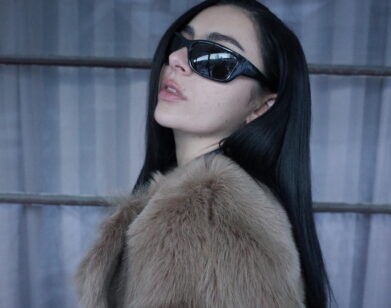Ben Rosenfield
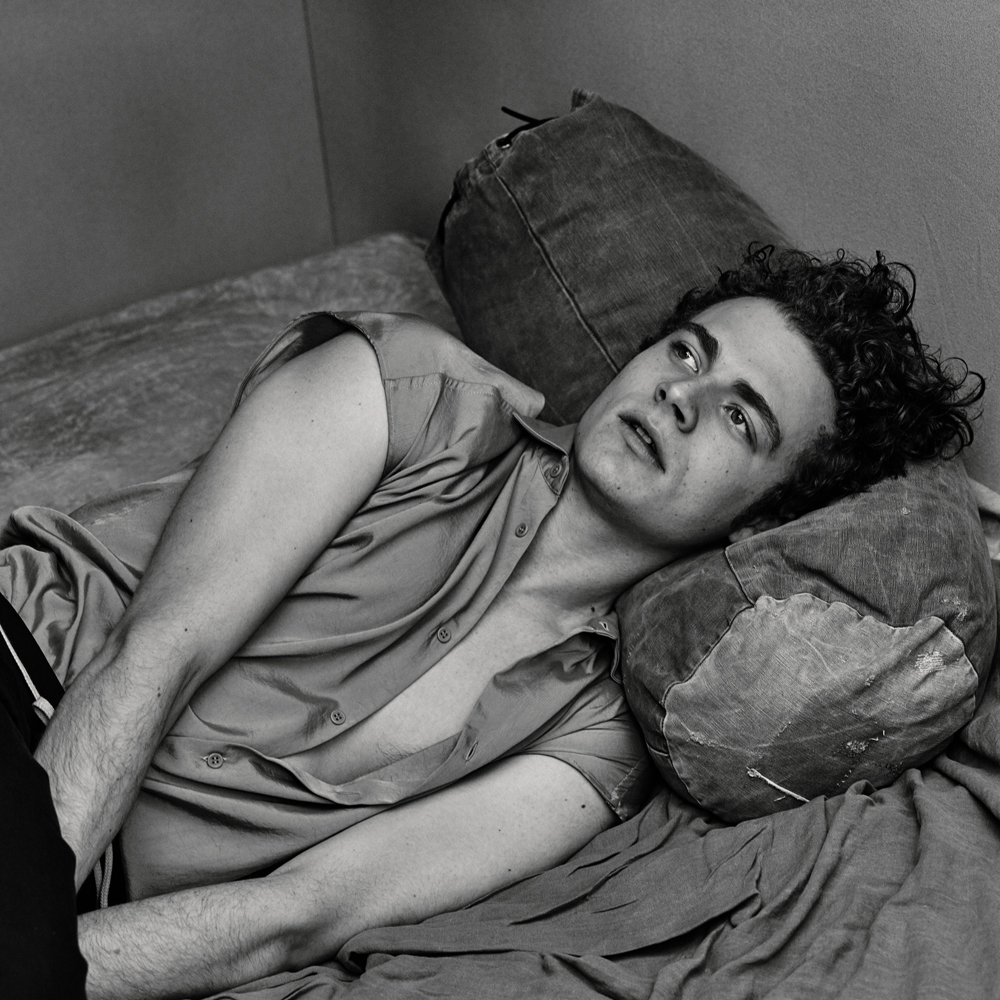
BEN ROSENFIELD IN NEW YORK, APRIL 2015. SHIRT: BOTTEGA VENETA. PANTS: MARGARET HOWELL. STYLING: KARL TEMPLER. COSMETICS: DIOR, INCLUDING DIORSKIN NUDE AIR HEALTHY GLOW ULTRA-FLUID SERUM FOUNDATION. HAIR: JAMES PECIS/D+V MANAGEMENT. MAKEUP: PETER PHILIPS FOR CHRISTIAN DIOR. MANICURE: MEGUMI YAMAMOTO FOR DIOR VERNIS/SUSAN PRICE NYC AND YUKO TSUCHIHASHI FOR DIOR VERNIS/SUSAN PRICE NYC. SET DESIGN: STEFAN BECKMAN/EXPOSURE NY. PRODUCER: SARA ZION FOR PRODN/ ART+COMMERCE. PRODUCTION MANAGER: ASHLEY SCOTT FOR PRODN/ ART+COMMERCE. RETOUCHING: GLOSS STUDIO. DIGITAL TECHNICIAN: NICHOLAS ONG. PHOTO ASSISTANTS: SIMON ROBERTS, HUAN NGUYEN, MARU TEPPEI, AND DEAN PODMORE. STYLING ASSISTANTS: MELISSA LEVY AND ALEKSANDRA KOJ. HAIR ASSISTANT: ADLENA DIGNAM. MAKEUP ASSISTANTS: EMIKO AYABE AND TALY WAISBERG. SET DESIGN ASSISTANTS: MAX ZINSER AND YONATAN ZONSZEIN. PRODUCTION ASSISTANTS: KAIA BALCOS AND JOHN DANIEL POWERS. SPECIAL THANKS: SOHO LOFTS.
In the past, Ben Rosenfield used music to get into character. To prepare for his part as an adrift young man seduced by wealth in the indie film Affluenza, he listened to Silver Jews and Elliott Smith. While filmming Hannah Fidell’s 6 Years, which tracks the disintegration of an increasingly toxic relationship, the now 22-year-old actor wrote a song that might have been penned by his character. The medium makes sense for Rosenfield; outside of his acting, the Montclair, New Jersey, native plays guitar, harmonica, and sings. He recently released a folk-influenced EP and played his first solo show at the Bowery Electric in New York. When he was working on the play The Nether in March, however, things began to change. “I realized I was starting to use music as a security blanket to get to certain emotional places,” he says. “Toward the end, I didn’t feel like I needed it, and there was something really freeing about that.”
Raised in a creative household, with an actress mother and a father who founded the American Comedy Institute in New York, Rosenfield began his acting career Off-Broadway opposite Carey Mulligan in Through a Glass Darkly in 2011, before being cast as Nucky Thompson’s nephew in HBO’s Prohibition-era gangster drama Boardwalk Empire. Next up, Rosenfield will appear in Woody Allen’s Irrational Man with Joaquin Phoenix. “I didn’t get the full script, but it seems like my scene was rather important,” he says. “Joaquin is one of my favorite actors, and Woody Allen is one of my favorite filmmakers. And it was my birthday, too, so it was sort of a beautiful combination.”
EMMA BROWN: How did you get involved in 6 Years? I heard Hannah was a fan of Boardwalk Empire.
ROSENFIELD: Hannah and Mark Duplass, who’s one of the producers, reached out to my agent and we all Skyped and they offered me the role. I was really taken by the script. It wasn’t a script, really—they called it a “scriptment.” It was a combination of descriptions of scenes—some scenes were written out—and pictures.
BROWN: Pictures from Urban Outfitters.
ROSENFIELD: [laughs] Yeah, I guess some of them were. Hannah collects photos for this reason—it’s a big way that she works, which is fantastic. As an actor, for me at least, it’s really important to know the director has a real visual sense and to get a sense of what the movie is going to look like because it is a visual medium. I related to the story a lot. I thought it was really starkly truthful.
BROWN: So there were marks that you had to hit, but no written dialogue—had you ever worked like that before?
ROSENFIELD: Yeah, actually the first acting class I ever took was taught by my mother and was an improv class. That was my foundation as an actor. It’s a great way to work; the spontaneity of it was incredible. It was really cool because as soon as I finished 6 Years I went to go shoot the fifth season of Boardwalk Empire, which is something that’s very scripted. You need to say the lines exactly as they’re written and you need to hit you’re mark and all the rest of it. So coming from this experience where we didn’t have to do any of those things and trying to bring that energy into a different set of circumstances was really fun and helpful for the performance.
BROWN: What are some of the downsides of improv?
ROSENFIELD: The downside is that if it’s not well directed and if people don’t have the sense for thinking of some funny things or interesting things to say, it can go nowhere. But I think it’s a great thing for all actors to do as an exercise, whether it’s in a class or actually for a final product. I think it’s a really, really important skill.
BROWN: Did you feel closer to the final product of 6 Years because some of the words were yours?
ROSENFIELD: I don’t know that I feel closer to it because of that, I just feel really close to that movie because it was a very personal experience for all of us and I’m really proud of it.
BROWN: It’s a very painful movie.
ROSENFIELD: Yeah it’s sad, but I like it because it’s about a very specific time in a relationship. It’s not some grandiose love story. It’s not making a big comment on that, it’s just a little glimpse of that specific time in a relationship and first love. It’s universal, but definitely sad.
BROWN: Was it sad to film?
ROSENFIELD: It was really fun because I was making all these great friends. Some of the scenes are really hard and I think everybody on the set had gone through something like that.
BROWN: A first love.
ROSENFIELD: Yeah, exactly. But there was a lot of teamwork going on and everyone was very invested in the project—the cast, the crew, just all the way down the line. Those tough, more emotional scenes, it was easier to get there and do it because there was a sense that everyone in front and behind the camera was very in it together.
BROWN: When people approach you about roles, do they still cite Boardwalk Empire, or is that changing?
ROSENFIELD: It’s changing a bit now. Boardwalk is still a big one. People saw A Most Violent Year, which I’m really glad about ’cause I think that’s a really great movie.
BROWN: You’ve worked with some great directors; do you feel like you’ve been able to pick and choose the roles that really interest you? Or, as a young actor, do you sometimes have to take roles because they will lead to other roles?
ROSENFIELD: The first few years in my career, it was about having experiences and learning and making some money so I can afford to live. But beyond the fact that Boardwalk is a great TV show, it also gave me some financial freedom. So these days I’m trying to absolutely only take on projects that I feel a very strong connection to. Which can be scary sometimes, but it feels like the right thing for right now. 6 Years was one of those movies where I knew I could go 100 percent with it. I wanted to go all the way with that character and the story, so I’m trying to trust that instinct and only go after projects that ignite that feeling in me.
BROWN: Is it scary if you go through a period where you’re reading all these scripts and nothing strikes you like that?
ROSENFIELD: It’s not scary; I’ve gotten used to it. It’s incredible how much bad content is produced, in my opinion. There’s also a lot of great stuff; you’ve got to read through everything because you never know when you’re going to find a gem somewhere. And they always come up—there’s never too long a wait.
BROWN: I know you’re musician as well. Do you get a different feeling when your onstage as a musician than when you’re onstage as an actor?
ROSENFIELD: Yeah, absolutely. I get very, very nervous playing my music in front of people, I think because I write it myself and they’re personal songs. It’s just a different feeling when you’re saying someone else’s words. I get some stage fright when I’m singing.
BROWN: Did you ever get stage fright as an actor?
ROSENFIELD: No. When you are opening the show, maybe you have a little stomachache right before you go on, but after a few days…
BROWN: Do you remember the first performance, theater or otherwise, that really struck a chord with you?
ROSENFIELD: When I saw Mark Rylance in Boeing-Boeing, I was pretty blown away by that. I’ve seen him in a bunch of things since then—he’s my favorite actor these days. Also seeing Patti LuPone in Gypsy was pretty incredible too. She was amazing.
BROWN: Have you ever felt like you needed to move to L.A.?
ROSENFIELD: I never felt like I needed to. I used to have a real sort of Woody Allen in Annie Hall reaction to Los Angeles, but recently I’ve been going there, crashing on a lot of the couches of the people who worked on 6 Years. I really like L.A. now. I thought about moving there recently. But not because I need to, because I want to.
BROWN: Are you allowed to talk about your Woody Allen film at all?
ROSENFIELD: I can’t say that I really know what the movie is about. I know it’s about a relationship between a teacher and a student, but I only worked on it a couple days.
BROWN: One criticism of Woody Allen is that all of his characters talk like him.
ROSENFIELD: I don’t think that that’s true exactly. I can do a Woody Allen impression but I was not doing a Woody Allen impression. The thing about Woody Allen is that he writes great words so you want to use them but he also really frees up the situation in terms of improv. He told all of the actors who were working there, “Just sort of say what you want.” He really lets the actors instincts do a lot of the work and trusts that either he cast it right or not.
BROWN: That’s interesting. I would think that he would be very precise.
ROSENFIELD: I think he is very precise but not in an overbearing way and not in a way that’s meticulous or nitpicky about the performance. He clearly has a technique in the way that he works; he does very few takes of things and I think he really is trusting the writing and the casting and not thinking too much about success.
BROWN: Did you have to audition for your part?
ROSENFIELD: Yeah, I came in for him and his casting people. I had auditioned for him before. That’s one of the best parts about being an actor in New York—sometimes you get to audition for Woody Allen.
BROWN: Did he recognize you?
ROSENFIELD: I doubt it. He’s very quiet.
BROWN: What’s the most nervous you’ve been for an audition? Do you get nervous?
ROSENFIELD: I get a little nervous. The first job I ever got was with this play with Carey [Mulligan]. I’d gotten close to some jobs before but I’d never done a chemistry read with an actor and I knew that that’s the last thing you had to do before you booked something. So I was definitely really nervous for that and really, really excited. It was really late at night too, it was at 10 pm in Midtown.
For more from our New Wave portfolio, click here.

